|
Grumman F4F Wildcat
These are images of the Tamiya F4F-4 Wildcat that I built to represent the
VMF-223 mount of Maj. John L. Smith, USMC. Major Smith took his squadron to Guadalcanal in August of 1942 as soon as
the japanese airfield under construction near Lunga Point had been taken by the Marines and was nearing completion by Navy
SeaBees. Under constant attack by japanese naval ships, aircraft and ground forces, the 1st MarDiv and Smith's Wildcats
fought a furious campaign against the finest and most experienced navy fliers that Japan could muster. Smith was credited
with 19 victories in the fight to secure the island, and was awarded the Congressional Medal of Honor for his exploits.
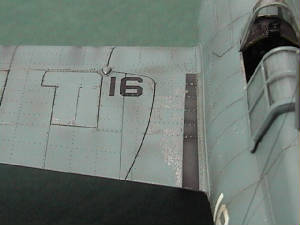
|
| Only at Henderson for a few days and already showing wear & tear... |
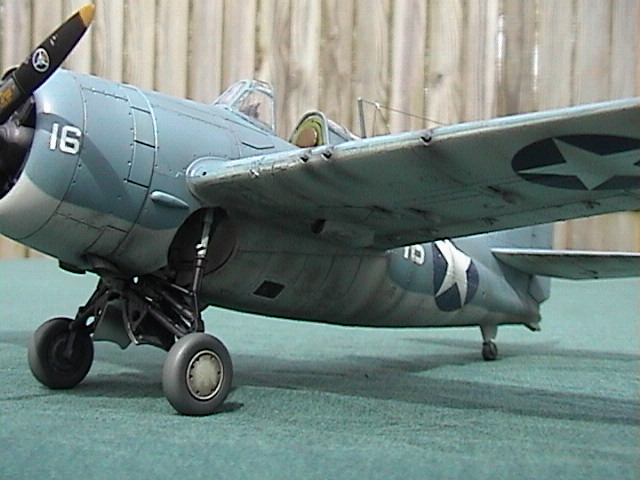
|
| The effects of coral gravel and mud are becoming evident. |
Another Wildcat, this time in the markings of AM1 Donald E. Runyon of VF-6
aboard the USS Enterprise, Fall 1942. Don Runyon achieved several victories as an enlisted pilot to achieve acedom prior
to the Navy's decision to commission all enlisted fliers. Credited with 10 victories, he also fought in the battle to
control the seas and skies of the Solomons when Guadalcanal was the focus of the War in the Pacific.
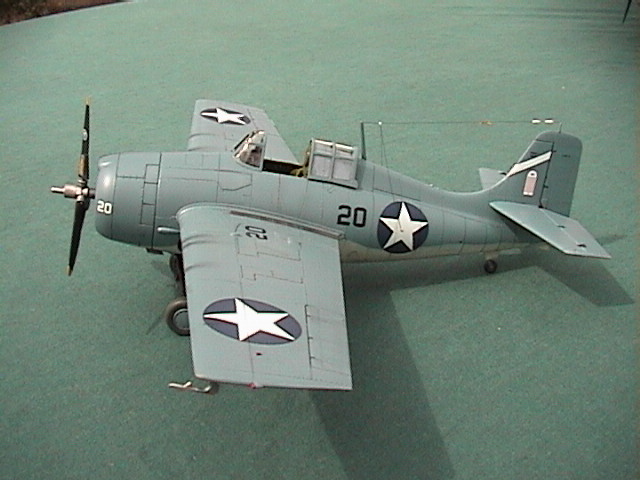
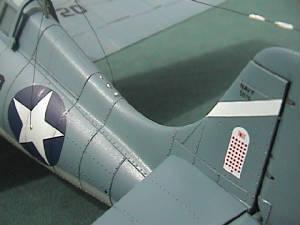
|
| VF-6 Wildcats wore tombstones with the squadron score on their tails in 1942. |
Grumman F6F Hellcat
Below: Hasegawa's 1/48th Hellcat in the markings of LCDR. James H.
Flatley, CVAG-5, USS Yorktown, Fall 1943. This poor model has been partially disassembled, stripped, and repainted about
three times, so it was a natural choice for finishing in the oversprayed 3-color scheme. Flatley's plane was an early
dash-3 (note the fairings over the gun barrels) shipped out in the intermediate blue over US light grey scheme with early
insignia. The specifications for both Navy camoflage and US insignia changed, so the plane received a darker non-specular
sea blue, and red trim was painted on the insignia.
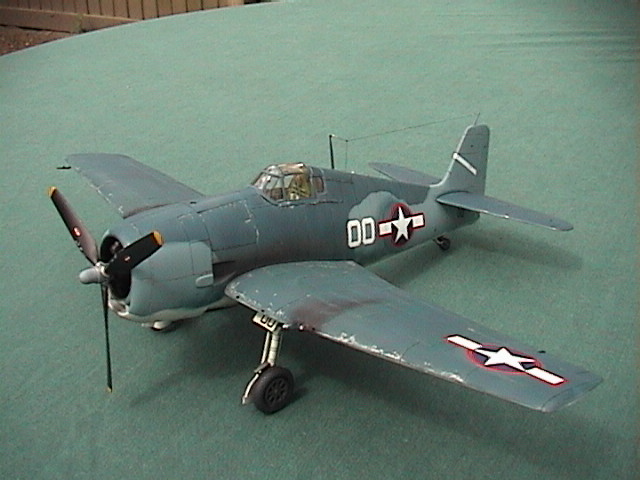
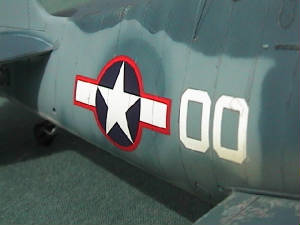
|
| Photos of this aircraft during the Marcus Island raids show ragged overpainting. |
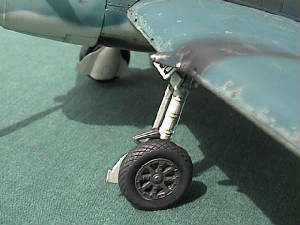
|
| Guns #2,3,4,& 5 were shrouded on the early production Hellcats. |
Same kit, done as an early dash-5 in the markings of CDR. David S. McCampbell,
CAG-15 aboard USS Essex in the summer of 1944. Modelers please note that through an error in my research I used the
wrong windscreen on this kit- it should be the later flat-faced variety. So, don't make the same mistake that I did.
Entire aircraft is in US Navy Dark Sea Blue, semi-gloss. Of the planes operated by US forces in WW2, the Hellcat produced
more aces than any other type. It was also the mount of the highest number of US "Aces-in-a-Day" and McCampbell was
the archetype among them having knocked down 5 or more enemy aircraft in a single day on more than one occassion. His
biggest one-day bag was 9.
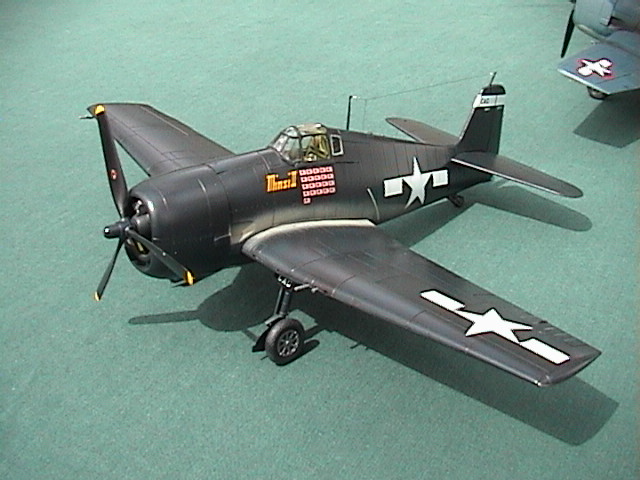
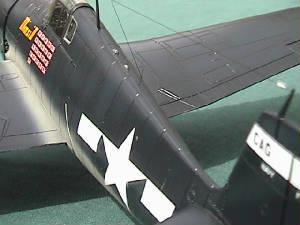
|
| The heavy exhaust stains were painted in thinned RLM02 Grau |
Vought F4U Corsair
Next two images below, Lt. Kenneth A. Walsh's F4U-1 Corsair, VMF-124, based
on Munda in the Fall of 1943. Ken Walsh was credited with 21 victories as US forces hopped up the Solomons Chain from
Guadalcanal to Bougainville. Operating from crushed coral rock airstrips in the Solomons Islands caused such wear and
tear on these aircraft that the weathering is usually significant.
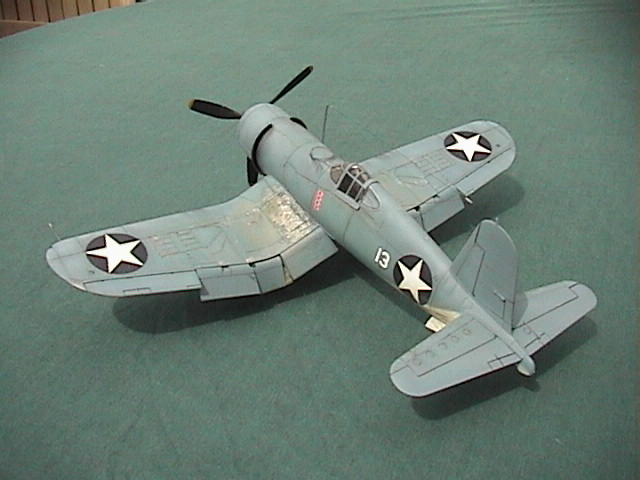
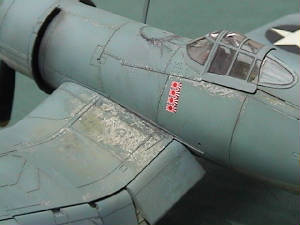
Below is the Tamiya 1/48th F-4U-1 Corsair in the markings of Lt. Ira 'Ike'
Kepford during his tour with the Navy's VF-17 in the Upper Solomons. Kepford was credited with 19 victories during the
winter of 1943 & 44, mostly during allied raids on Rabaul- at the time the most important Japanese Naval Base in the Pacific
Theatre. I can't remember if there was ever a time that I didn't have a model of this one somewhere in my collection-
it has proved a lasting favorite among modelers.
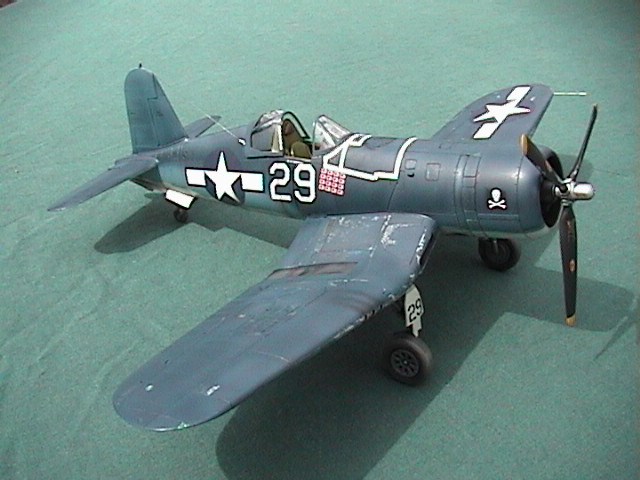
|
| The cowling tape was an attempt by groundcrews to control chronic leaks from the fuselage fuel tank |
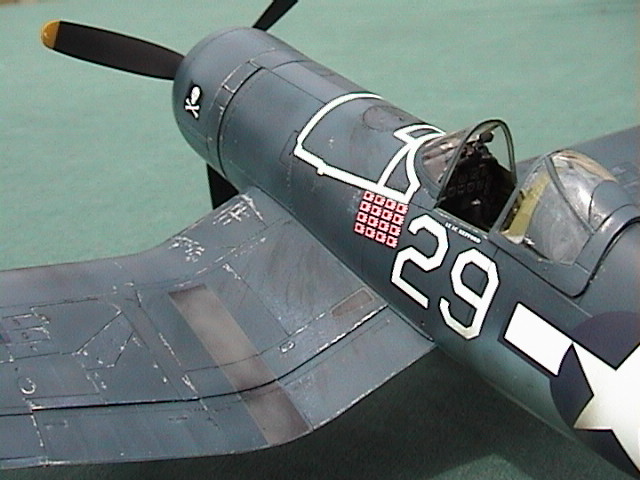
|
| I used the Techmod sheet for the markings- very impressed with the quality |
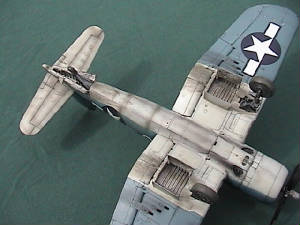
|
| More mud courtesy of the rainy Solomons Islands... |
And, finally, the Tamiya 1/48th F-4U-1D Corsair built out-of-the-box
in the markings of LCDR Roger R. Hedrick while was leading VF-84 aboard the USS Bunker Hill in1945. Hedrick, a veteran
of CDR. Tom Blackburn's legendary VF-17 Jolly Rogers while they were based in the Upper Solomons in early 1944, gained several
victories during raids on Japanese air bases in the home islands, and in defense of the invasion forces on Okinawa and Ie
Shima. The yellow on the cowl was a temporary marking applied to Task Force 58 aircraft participating in the raids on
Japan.
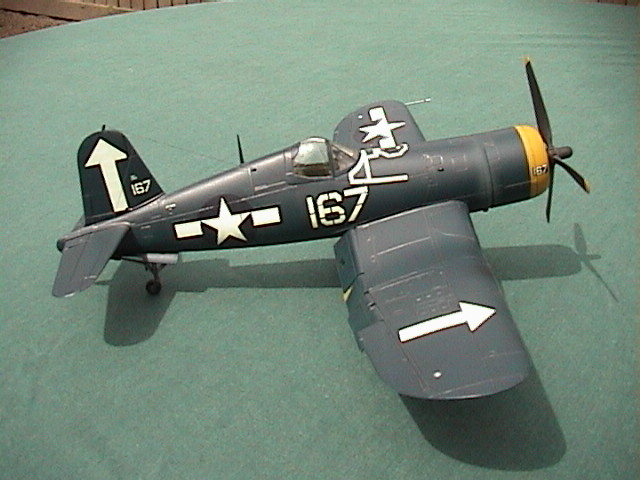
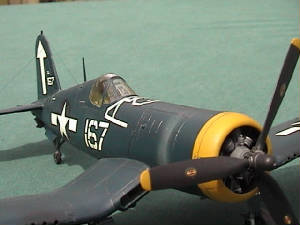
|

